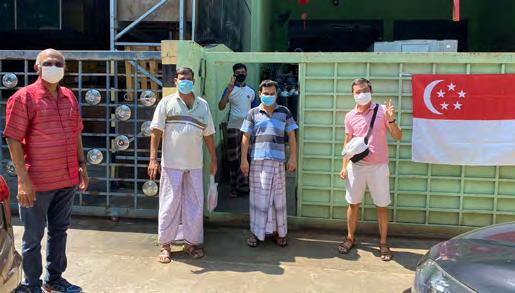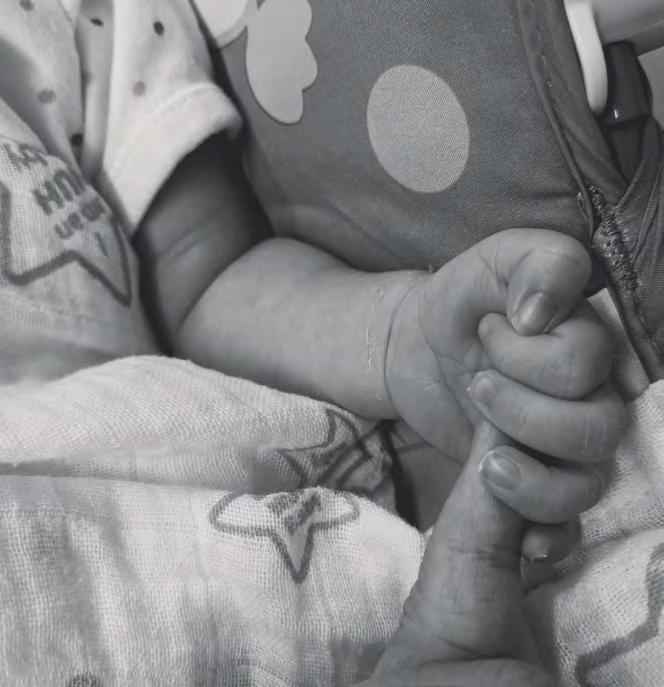
7 minute read
Looking Outward in Isolating Times
Daniel Tham
The COVID-19 pandemic has had a profound impact on Singapore, affecting many livelihoods and almost everyone’s lifestyles. Much adjustment has also been needed in the local church: the Anglican Diocese of Singapore suspended all onsite worship services and gatherings beginning 19 March 2020—two weeks before the nationwide Circuit Breaker measures kicked in. In SJSM, as in other churches in Singapore, many would agree that spiritual and community life has not been the same since.
Advertisement
In times like these, what is God saying to us as His church, and how is He shaping us through these circumstances? In pondering these questions, my attention was drawn to the outlook and outreach of one SJSMer, Leo June Kit; his journey is one that I have found inspiring in these isolating times, and his outwardlooking perspective offers one possible answer.
Finding Strength and Direction
Over the past two years, June Kit has been battling a condition marked by extreme fatigue and dizziness. To date, this has yet to be clearly diagnosed. For one and a half years, June Kit was so weak that he was effectively homebound, having to spend most of the day lying down. Eating, breathing, and even walking within the house was exhausting. Thankfully, his condition started improving since November 2019, and he has been able to resume teaching on a reduced workload, as he still fatigues easily.
When COVID-19 struck, June Kit's thoughts were with his Bangladeshi friend Ashik (name changed to protect his privacy). Ashik first voluntarily stepped into SJSM in 2013, where he was befriended by several SJSMers including June Kit who subsequently walked with him on his journey towards baptism in 2015. Just before Circuit Breaker, June Kit managed to visit Ashik at his dormitory to see how he was doing.
During the visit, June Kit discovered that the residents were scared—some even suicidal—over the situation
they were in; unable to work and thus having no salary, no food, and no option to leave. For them, the situation was (and still is) rife with crippling uncertainty.
June Kit had already been seeking God’s direction for his particular area of service before the start of the pandemic. Central to this were two convictions he held on to dearly: that the church should always be a part of and in service to the community, and that God has a special place in His heart for “the last, the least, and the lost”. These convictions became even stronger with the onset of COVID-19, and his awareness of the urgent predicament faced by Ashik and his compatriots.
Called to Action
June Kit firmly believes that loving others requires us to love the communities we are placed in, or led into, and that “the church ought to endeavour to be among the first responders to the needy around us”, whether their needs are physical, emotional, or spiritual. This is not about rushing into things hastily, he adds, but more about the posture of the heart: a willingness and readiness to make ourselves available to those in need, just as our Lord Jesus and the early disciples did. remember that caring for and loving others has to begin from a genuine position of love and concern for the other person’s well-being and interests. This means putting aside our agendas and how we want to help, and instead empathising and understanding their needs and concerns.
As Circuit Breaker began, June Kit took the initiative to survey the ground in search of opportunities to serve the needy. As he was getting better, but still mindful of his ongoing fatigue, he looked for opportunities that were less physically demanding, such as packing food in soup kitchens, and delivering meals and essentials to the needy and the expatriate brothers (migrant workers).
Under Ps Andrew Raman’s leadership, SJSM started partnering the Alliance of Guest Workers Outreach (AGWO) in adopting two dormitories in Tuas. June Kit did not hesitate in signing up to help, although he was aware of his own limits due to his condition. “If I had energy to serve at all,” he shares, “I wanted to serve my parish first, because this is the community that God has planted me in.”
The SJSM team June Kit joined was tasked with providing both halal and non-halal meals to the workers in the dormitories during Ramadan, the Muslim fasting month. Although
An expatriate brother receiving prayer for an ear problem.
they had just about a week to plan, June Kit was touched and greatly encouraged by the overwhelming response by his fellow SJSMers—they rallied to contribute necessary items, assist in food deliveries, and with various collections for and deliveries of items like hair clippers and games equipment, to address the workers’ physical as well as socio-emotional needs.
“The same love and care we ourselves have received from God, we would like to share with our brothers too,” June Kit says. While meeting immediate physical needs is crucial, one must also take psychological and socio-emotional needs into consideration—building relationships based on trust and sincere friendship is very important. This is the basis of Care Connexion, a new outreach ministry to the dormitories, under SJSM’s Missions department. A Facebook page has also been set up to facilitate online interaction and ministry.
Shifting Paradigms
To June Kit, this ministry required a paradigm shift. “When we call them migrant workers,” he explains, “we segregate them by status and value.” In discussion with Ps Andrew, the team decided on the term “expatriate brothers and sisters” to accord them the dignity and respect they deserve. While this is a timely mindset change, there remains a needed shift in how we view our own efforts in serving others. This is especially relevant now, when many Singaporeans, SJSMers included, are themselves struggling to make ends meet, to adjust to new arrangements for working from home, to find time for adequate rest, or to stay safe for the sake of their own families. June Kit is careful to point out that these are very real concerns that need loving attention, which require community support, and should not be dismissed or swept under the carpet.
It is no surprise that this is one of the leading reasons many people are unsure about committing to community service, at a time when it is most needed. In fact, as pandemic safety regulations gradually relax, and with more people returning to their workplaces, it has become harder to find volunteers to keep such ministries going. This is accompanied by the common perceptions that it is intimidating to make new friendships— something that introverts in particular find to be outside their comfort zones.
As an encouragement to those struggling with various challenges in their own lives, June Kit adds on, “We need not do grand things for our service to be meaningful. God knows our frame. He is more concerned with the posture of our hearts, than

Ps Andrew (left) and June Kit (right) at one of their befriending visits to a dormitory in Tuas.
the form of what we do. As we love and serve with a sincere heart, even our smallest actions will make a difference to the lives of others, and be a fragrant offering to our heavenly Father.” He believes that loving and serving others can start with whatever relationships that God has already placed in our lives, such as in our families, neighbourhoods, workplaces, and churches.
“It is possible for us to love and serve others even in our weakness. We can care for others in whatever little capacities God has given us grace to, for the different seasons of our lives,” reflects June Kit. These words, coming from someone fighting his own battles with chronic fatigue, inspire me greatly as I wrestle with my own constraints and limited capacity during this period. It is in turn my prayer that in these times, so marked by isolation and a tendency to focus on ourselves, that our attention—and our prayer, time, and service—be directed outwards, to those who most need the experience of God’s love put into action.
“Taste and see that the Lord is good” (Psalms 34:8) is the invitation that resounds, almost counterintuitively, in the face of trial and tribulation. That might just be what God is saying to us, individually and as a church, as we keep looking outwards during this difficult season.










